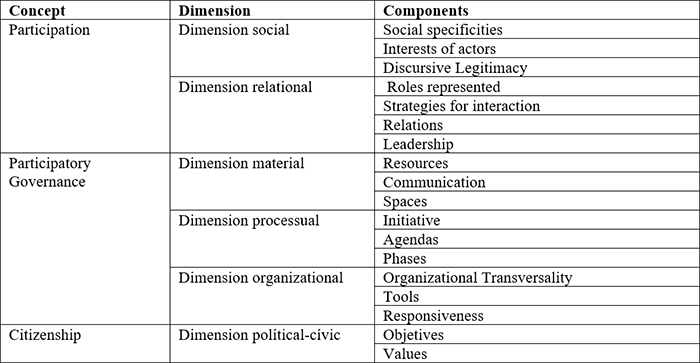Governance Dashboard
The approach to NBS takes place within an urban governance context which sets a particular context to its implementation. So, to speak of co-creation in URBiNAT means to co-create within a municipal governance context. Although citizens’ initiatives were welcome, it was predominantly participation initiated by the partners of the project that took the lead in URBiNAT. As they have been designed, participatory processes aim to raise the level of influence of citizens in the co-creation of NBS and, by doing so, leveraging a governance context into a collaborative governance setting.
By using the Interpretative framework of participatory processes and participatory municipal governance (Ferreira, 2022), this dashboard offers an overview of the main dimensions and components that emerge from the co-creation process of NBS. Based on the analysis of the culture and practices of participation in each city, the dashboard enables to roam
over the results from the research undertaken in the three front-runner cities of URBiNAT. A set of dimensions and corresponding components (see table below) according to the perspectives of the four typologies of actors that intervene in the co-creation process, and that are central in understanding participatory processes, are revealed.

Source: Ferreira, I. Governance, citizenship and participation in small and medium-sized cities: a comparative study between Portuguese and Canadian cities. 2022. [PhD Thesis, Universidade de Coimbra]. Estudo Geral. https://estudogeral.uc.pt/handle/10316/101712
Dashboard
Sources and more information
- Data collection and analytical approach: Tthe dashboard is based on the data collected through 20 in-depth interviews that were conducted throughout the URBiNAT project lifespan in the 3 front-runner cities (Porto, Sofia and Nantes), among different typologies of actors: citizens (organized and non-organized), public officers (Technicians), researchers and political representatives. The interviews were transcribed and translated, and their treatment and analysis was partially supported by using the software MaxQda as a means to help codify and organize the large amount of data gathered. The codification process relied upon the interpretative framework for participatory processes (Ferreira, 2022).
- Interpretative framework: The Interpretative framework of participatory processes and participatory municipal governance that served as a useful tool in URBiNAT is based on an evidence-based framework that is grounded in research that takes an intensive and qualitative approach. It is based on case studies (2 countries, 4 cities, 5 projects per city), and is in the form of a comparative study between two Portuguese and two Canadian cities. Research was based on the analysis of documentary sources and records of directly observed events that occurred in projects carried out by both citizens and municipalities. It also includes oral records of semi-structured interviews with 86 actors who intervened in the four cities, including citizens, technicians and politicians.
Ferreira, I. Governance, citizenship and participation in small and medium-sized cities: a comparative study between Portuguese and Canadian cities. 2022. [PhD Thesis, Universidade de Coimbra]. Estudo Geral. https://estudogeral.uc.pt/handle/10316/101712 - Other info: For more information on the strategy of URBiNAT in addressing collaborative governance’ approaches: Ferreira, I; Caitana, B.; Nunes, N. Policy brief: Municipal committees to experiment innovative urban governance in nature-based projects, aimed at inclusive urban regeneration. Local Democracy Academy. 2022. https://icld.se/wp-content/uploads/2022/05/ICLD_Policy-Brief_26-web.pdf
For more information on strategies from EU-funded and sibling projects of URBiNAT in addressing collaborative governance’ approaches: European Commission, Directorate-General for Research and Innovation, Ferreira, I., Lupp, G., Mahmoud, I., (eds), Guidelines for Co-creation and Co-governance of Nature-Based Solutions: Insights from EU-funded projects, Publications Office of the European Union, pp. 1-98 2023, https://data.europa.eu/doi/10.2777/157060

